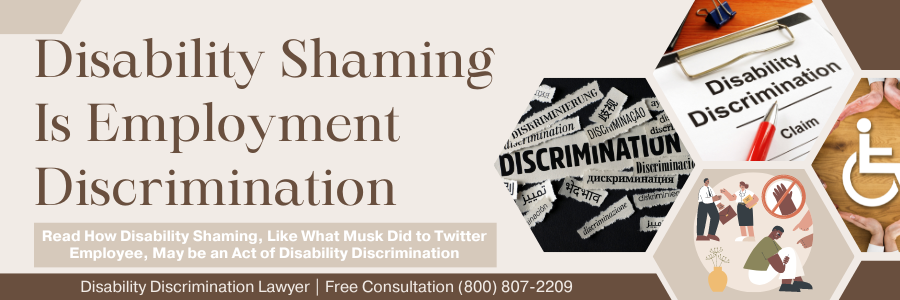Read How Disability Shaming, Like What Elon Musk Did to a Twitter Employee, May be an Act of Disability Discrimination
Disability shaming and Elon Musk have been all over the news throughout the past two weeks. Mr. Musk decided to openly and publicly mock a disabled Twitter employee who had been laid off. He chose to publicly call to light the employee’s disability by questioning it through a tweet and questioning his need for accommodations in the workplace.
Mocking a disabled employee may seem legal, although highly unethical and cruel. However, it may not be legal. It may actually be an act of disability discrimination which can lead to a hostile work environment. Employers can and should be held to a higher standard when dealing with issues, such as employee disabilities.
What Is Disability Shaming?
Shaming is a popular term used to describe an act of making fun of an issue or trait. Disability shaming is when a person or people ridicule, mock, and question a person’s disability. For instance, if a person doesn’t “look disabled,” people may shame that person by questioning if they are really disabled. They may accuse the person of using a fake disability to get benefits.
Some examples of disability shaming may include the following scenarios:
- A person has severe anxiety. His coworker tells him that he is “just acting” and that he is a baby who just doesn’t know how to be an adult.
- A person requires accommodations because he suffers from chronic pain syndrome. His boss argues that he should just muscle through the pain. His boss also makes jokes about the person’s “supposed” pain.
- A person is in a wheelchair. His coworkers joke about the wheelchair and his need for it, even after they have been asked to stop.
These are just a few examples of disability shaming. Such actions can be seen as cruel. However, they can also lead to a hostile work environment (a work environment in which a person feels they cannot continue to conduct their daily work responsibilities due to extremely negative behaviors).
How Can Disability Shaming Lead to Disability Discrimination?
When people think of disability discrimination, they often think about the person in a wheelchair not receiving the right to work or the accommodations necessary to complete daily employment activities. However, disability discrimination is so much more than the physical right to work and receive accommodations.
Disability discrimination occurs when a disabled employee is denied the right to work in a peaceful work environment that protects his right to work and his right to accommodations. It can occur when a person’s disability is publicly discussed amongst employees, even when it is not public knowledge. For instance, a person with diabetes has the right to keep his diabetes private. Should he choose to tell his employer or HR about it, he has the right to expect that information to remain private. If it is publicly discussed amongst others without the disabled employee’s permission or knowledge, it is a violation of several workplace laws, including disability discrimination laws.
Disabled employees also have the right to expect their employers and workplace will not mock their disabilities. For instance, if a woman suffers from severe anxiety, she has a right to expect accommodations to help her work. She also has a right to expect her employer will not question her disability or mock it in any way. If her employer cannot abide by these rights, it may create a hostile work environment. As a result, she may have a claim for disability discrimination.
Disability shaming can be extremely volatile in any workplace. If it is permitted and even committed by employers and coworkers, it can lead to other medical ailments (such as depression, anxiety, extreme stress, and more) and be a cause for disability discrimination as we result.
What Can You Do If You Are a Victim of Disability Shaming?
If you are an employee in any workplace with fifteen or more employees, you have the right to legally fight back against disability shaming. You have the right to insist your employer puts an end to such practices or face legal penalties.
First, you must attempt to ask your employer to stop disability shaming and disability discrimination in the workplace. Approach your employer or your HR team with documented instances of such behavior. Make sure to include as much information as possible, such as dates, who was involved, and what was said or done.
If that does not work, you have the right to seek legal counsel and hold your employer accountable for the hostile work environment that occurred as a result of disability shaming and disability discrimination. Contact an employment discrimination lawyer to discuss your legal options.
If you or someone you know is a victim of employment discrimination resulting from disability shaming, the experienced and compassionate employment discrimination lawyers at the Derek Smith Law Group in New York City, Philadelphia, Miami, Los Angeles, San Francisco, and New Jersey can help. Call 800.807.2209 for a free consultation.

